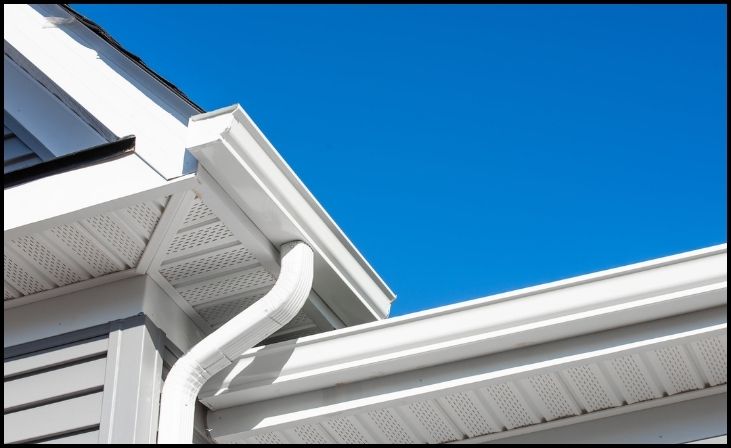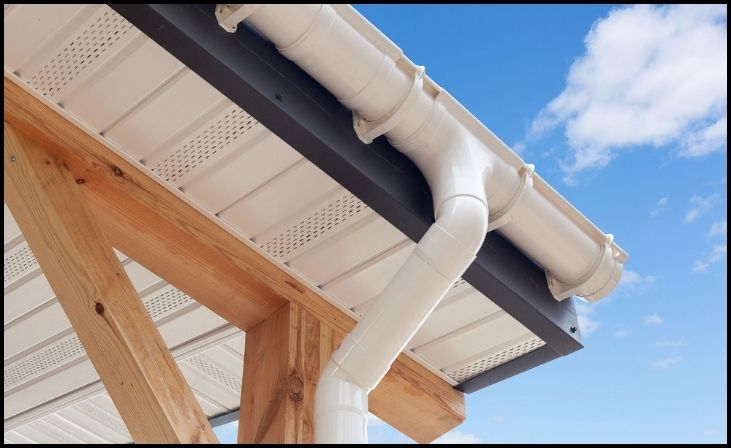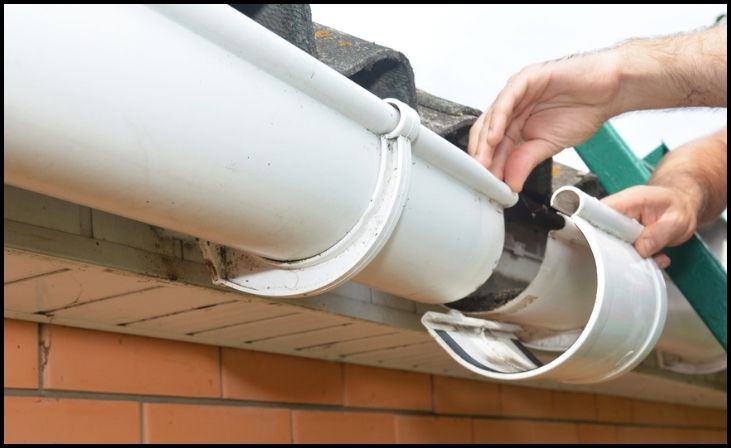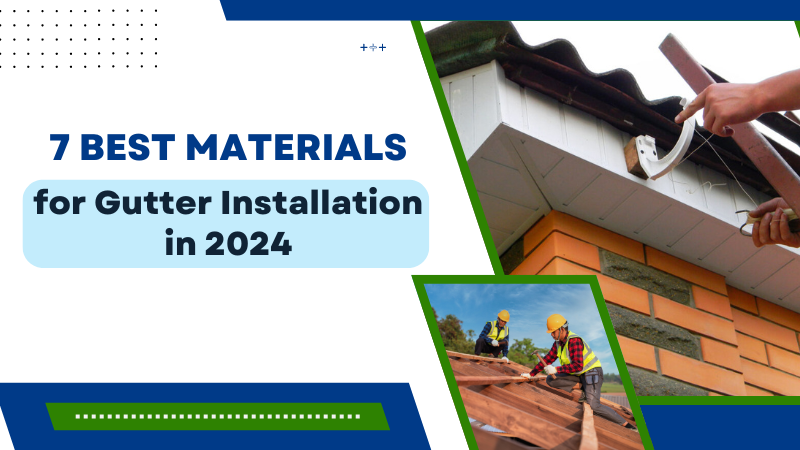Materials for Gutter Installation in 2024 : Selecting the right material for your gutters is crucial for ensuring the longevity and efficiency of your home’s drainage system. With advancements in technology and materials, 2024 offers a range of options that cater to various needs and budgets. From traditional choices like aluminum to modern alternatives like stainless steel and copper, each material comes with its unique set of advantages.
Understanding these materials will help you make an informed decision that complements your home’s architecture and stands up to the elements. In this blog, we’ll explore the seven best gutter materials for 2024, discussing their durability, maintenance, and aesthetic appeal to help you choose the best option for your home.
Best Materials for Gutter Installation in 2024
In 2024, choosing the best gutter material is essential for optimal performance and longevity. Advances in technology and design offer a range of options to suit various needs, from durability and maintenance to aesthetic appeal.
1. Aluminum

Aluminum gutters are a top choice for many homeowners due to their combination of lightweight design and rust resistance. These gutters are available in a variety of colors, which can be easily matched to your home’s exterior or painted to achieve a desired look. The lightweight nature of aluminum makes installation straightforward and less labor-intensive, often allowing for DIY projects. Furthermore, aluminum is relatively affordable compared to some premium materials.
However, aluminum gutters are not without their drawbacks. They can be prone to denting, especially if exposed to hail or heavy impacts. Additionally, while aluminum is resistant to rust, it may not be as durable in areas with extreme weather conditions, such as heavy snowfall or high winds, which could lead to more frequent replacements or repairs.
2. Copper
Copper gutters are renowned for their exceptional durability and elegant appearance. One of their most distinguishing features is their ability to develop a patina over time, which many find visually appealing. This patina not only enhances the aesthetic of the gutters but also adds a protective layer that further resists corrosion. Copper gutters are highly resistant to rust and can last for several decades, making them a long-term investment for your home.
However, the initial cost of copper gutters is significantly higher than that of other materials, which can be a considerable factor for those on a tight budget. Despite this, the longevity and classic look of copper often justify the investment, especially for high-end or historically styled homes.
3. Stainless Steel
Stainless steel gutters are celebrated for their remarkable strength and resilience, particularly in harsh weather conditions. The material’s inherent resistance to corrosion and staining makes stainless steel a reliable choice for areas that experience heavy rainfall, snow, or extreme temperatures. These gutters require minimal maintenance compared to other materials, as they do not rust or corrode easily.
However, the premium nature of stainless steel comes with a higher price tag, which can be a deterrent for some homeowners. Despite the cost, many find that the durability and longevity of stainless steel gutters offer good value for money, as they often outlast cheaper alternatives and maintain their functionality and appearance over time.
4. Vinyl

Vinyl gutters are a popular choice for those seeking an economical and easy-to-install option. These gutters are lightweight and resistant to rust, which makes them ideal for DIY projects and budget-conscious homeowners. They come in various colors, allowing for a customizable look that can match your home’s exterior. Installation is relatively straightforward, which contributes to lower labor costs. However, vinyl gutters have some limitations.
They can become brittle over time, particularly in extreme temperatures, which may lead to cracking or warping. This brittleness can reduce their overall lifespan and performance, especially in regions that experience severe temperature fluctuations or intense weather conditions.
Also Read : 8 Steps for Installing Gutters on a DIY Project
5. Galvanized Steel
Galvanized steel gutters are known for their robust construction and resistance to heavy rainfall, making them suitable for areas prone to intense weather. The galvanization process, which involves coating the steel with zinc, helps prevent rust and corrosion, enhancing the gutters’ durability. However, galvanized steel gutters are generally heavier than alternatives like aluminum or vinyl, which can make installation more challenging and labor-intensive.
Additionally, while the zinc coating provides significant protection, it is not impervious to rust. Periodic maintenance, including repainting and checking for signs of wear, is necessary to ensure the gutters remain functional and aesthetically pleasing over time.
6. Zinc
Zinc gutters offer a durable and aesthetically pleasing alternative to copper, with a somewhat lower price point. Like copper, zinc gutters develop a patina over time, which not only adds character but also enhances their resistance to corrosion. This natural patina helps protect the metal from the elements, contributing to a long lifespan that can exceed several decades.
Zinc gutters are relatively low-maintenance compared to other materials, as they do not require frequent painting or treatment. Despite their advantages, zinc gutters may still be more expensive than materials like vinyl or aluminum, and their availability might be limited in some areas. Nevertheless, their longevity and unique appearance often make them a worthwhile investment.
7. Fiberglass

Fiberglass gutters are known for their durability, lightweight nature, and resistance to rust and corrosion. These features make them particularly suitable for coastal areas where saltwater can be damaging to other materials. Fiberglass gutters can be custom-made to fit specific dimensions, offering a tailored solution for unique or non-standard home designs.
They are also resistant to impacts and do not require regular maintenance, which is a significant advantage in areas with high exposure to the elements. However, fiberglass gutters are less common and might be harder to source compared to more traditional materials. Their niche availability can sometimes make them a more challenging option for homeowners looking for a quick or cost-effective solution.
Conclusion
Choosing the right gutter material for your home in 2024 involves weighing factors like durability, cost, and aesthetic appeal. Each material offers its unique set of benefits, whether it’s the classic elegance of copper, the strength of stainless steel, or the affordability of vinyl.
By considering your local climate, budget, and maintenance preferences, you can select the material that best meets your needs. Investing in high-quality gutters will not only enhance your home’s curb appeal but also ensure efficient water management and protection for years to come.
FAQs
What are the most durable gutter materials?
Copper, stainless steel, and zinc are among the most durable gutter materials due to their resistance to corrosion and long lifespan.
Are there gutter materials that require less maintenance?
Yes, materials like stainless steel and copper generally require less maintenance compared to aluminum and galvanized steel, which may need regular checks to prevent rust.

